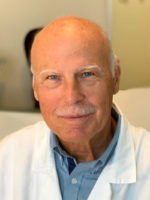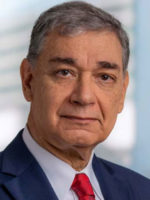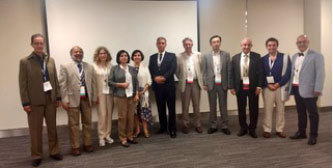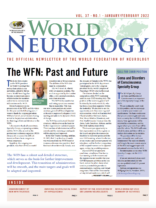By Wolfgang Grisold, MD

Grisold
This column on the Committees and Specialty Groups is the latest of this series, which has been edited by me in my previous role as the secretary general. It serves to provide more insight into the role of the WFN committees as well as the specialty groups. It also allows the international readers to see the works and activity of the committees and groups as well as to allow them to engage in a particular topic. The duration of leadership in the Specialty Groups and Committees is limited. The trustees may consider to rearrange some committees to adapt to ongoing needs. Therefore, we will continue this column so that we can explain the composition, but also the tasks and the people behind them.
This month, we will introduce the Education committee, chaired by Steven Lewis. He will outline this committee’s work. Being part of this committee over the years, I am proud of its achievements and am aware that this content is one of the main tasks and missions of the WFN. The present activities have been reduced by COVID in almost all aspects, but the new administration will support continued evolution of our activities; in addition to resuming the Teaching Centers and Department Visits, we will be able to provide a core curriculum, as well to look into new activities related to education, such as advocacy and leadership.
From the Specialty Groups, we choose the Environmental Neurology Specialty Group, which is presently chaired by Gustavo Román, and has made us aware of the importance to consider environment on neurology. Much credit goes to Jacques Reis who organized meetings in Strasbourg and made environment the topic of the WBD 2018. At that time, the significance of the topic was not appreciated by some, but over time, this initiative has become extremely valuable. This group has also been active since the beginning of the pandemic and has written an important paper.
WFN Education Committee
The chair of the WFN Education Committee is Steven Lewis (U.S.), the current acting secretary general of the WFN, and the co-chair is Riadh Gouider (Tunisia), current co-opted WFN Trustee. For a list of current members, please see the WFN website.
The task of the WFN Education Committee is to provide strategic direction and oversight to the many current and future educational activities of the WFN, in keeping with the mission of the WFN to foster quality neurology and brain health worldwide by promoting global neurological education and training, with the emphasis placed firmly on underresourced parts of the world.
Current activities of the Education Committee include the WFN Department Visit Program, where trainees from low- and lower-middle-income countries, primarily from Africa, can attend four-week observerships. This allows these trainees to witness the breadth of neurology in outstanding institutions in Europe (for African trainees) and Canada (for trainees from Africa and Central and South America), due to the generous support and hospitality of these local societies and institutions.
In addition, the Education Committee organizes and oversees the WFN Teaching (Training) Centers to provide neurological training opportunities for residents of low- and lower-middle income countries. There are currently five WFN Teaching Centers, two for Anglophone African trainees (Cairo, Cape Town), two for Francophone African trainees (Dakar, Rabat), and one for trainees from Central and South America (in Mexico City).
Both the Department Visit Programs and the Teaching Centers were “on hold” during the COVID-19 pandemic, but all are resuming this year to provide much needed short- and long-term training for young neurologists in low- and lower-middle-income countries. Likewise, the WFN Junior Traveling Fellowships provide bursaries for up to 30 young neurologists and trainees annually to attend national and international meetings; this program is also resuming this year after being on hold during the pandemic. A recent call for JTF applicants for 2022 was just announced.
Please see previous issue of World Neurology for reports from many of the trainees who participated in the Department Visit Program, Regional Training Centers, and recipients of Junior Traveling Fellowships.
In addition to the above, another important activity of the WFN Education Committee is oversight of the AAN/WFN Continuum program, where hard copies and online access of Continuum, the AAN’s official CME journal, is provided free (in both hard copy and online form, depending on preference) for the education of neurologists in low- and lower-middle-income countries.
These are just some of the many activities of the WFN Education Committee, with many additional activities and projects organized and supported by a growing number of educational subcommittees, including those involved in eLearning and various other critical educational offerings to improve neurologic education and care throughout the world.
WFN Environmental Neurology Specialty Group

Gustavo Roman
The chair of the Environmental Neurology Specialty Group is Gustavo Román (U.S.) and the vice chair is Şerefnur Öztürk (Turkey). For a list of current members, please see the WFN website.
History of the WFN Environmental Neurology Specialty Group (ENSG)
The idea of creating a dedicated research group on environmental issues in neurology arose during the World Congress of Neurology (WCN) in Sydney in 2005. In 2007, Prof. Prockop announced its creation in a letter published in the Journal of the Neurological Sciences (JNS). The Environmental Neurology Applied Research Group (ENARG), as it was originally called, became the successor of the former neurotoxicological group, created and chaired by Prof. Prockop. The first members considered that interactions between man and his environment, as well as the environmental impact on our health, notably brain health, have a major importance for neurologists. The recent pandemic illustrates the pertinence of the holistic and transdisciplinary approach that characterizes environmental neurology.
Aim and vision: The goals of the ENSG are to increase awareness of the relationship for the environment and neurological disorders, to promote education and clinical research in all matters having to do with the adverse effects of environmental substances of interest, including agents that occur naturally (algal toxins, phytotoxins, and mycotoxins associated with neurological disease, in addition to neurotropic viruses), as well as pollutants that arise as a result of human activity.
Humans may be exposed to these substances/events in industrial/occupations/situations or as a result of terrorism or forced displacements. There are important global threats, such as water pollution, environmental triggers of sporadic neurodegenerative diseases, global warming, and COVID -19 (including long COVID).

Members of the ENSG.
Activities: Since our 2015 report, the ENSG has had a major impact on the activities of the WFN. We have participated in 2017 Kyoto, 2019 Dubai, and 2021 Rome (virtual) congresses. In 2018, the ENSG acted as scientific adviser for World Brain Day and issued a dedicated article. The impact was interesting, although this day was ignored by several societies. In 2020, anticipating the huge neurological impact of the COVID-19 pandemic, our group launched a call for registries in neurology and issued one of the most cited articles summarizing the knowledge about the neurological involvement of COVID-19.
In our presentations at the WCN in Rome, we summarized the first lessons from the COVID -19 pandemic. Our goal is to provide quickly to all neurologists worldwide accurate information about the diagnosis as well as of the therapies, and to improve our knowledge by managing dedicated easy-fulfilled registeries worldwide. A good example of such absence is illustrated by the difficulties in studying the neurological aspects of the Long-COVID. International comparisons are obviously needed from neurologists as for decision-makers in health policies.
Our most important project is to involve worldwide neurologist in a survey by questionnaire and then to promote an education a course online.
To our knowledge, no other specialty has ever created a group dedicated to environmental aspects in their discipline. For a list of publications of this group, please see the box. •
Publications by the Group Members Related to Environment and Neurology
- Special Reports: History of the WFN Environmental Neurology Applied Research Group. https://worldneurologyonline.com/article/special-report-history-of-the-wfn-environmental-neurology-applied-research-group/
- Reis J, Román GC. Environmental neurology: a promising new field of practice and research. J Neurol Sci. 2007 Nov 15;262(1-2):3-6. doi: 10.1016/j.jns.2007.06.017. Epub 2007 Jul 24. PMID: 17651758.
- Román GC, Spencer PS, Reis J, Buguet A, Faris MEA, Katrak SM, Láinez M, Medina MT, Meshram C, Mizusawa H, Öztürk S, Wasay M; WFN Environmental Neurology Specialty Group. The neurology of COVID-19 revisited: A proposal from the Environmental Neurology Specialty Group of the World Federation of Neurology to implement international neurological registries. J Neurol Sci. 2020 Jul 15;414:116884. doi: 10.1016/j.jns.2020.116884. Epub 2020 May 7. PMID: 32464367; PMCID: PMC720473
- Wasay M, Khoja A. Environment and Neurological Diseases: Growing Evidence for Direct Relationship. J Coll Physicians Surg Pak. 2018 May;28(5):337-338. doi: 10.29271/jcpsp.2018.05.337. PMID: 29690958.
- Reis J, Spencer PS, Wasay M, Grisold W, Carroll WM. Clean air for Brain Heath; ongoing agenda of 2018 World Brain Day. J Neurol Sci. 2019 Feb 15;397:61-62. doi: 10.1016/j.jns.2018.12.015. Epub 2018 Dec 12. PMID: 30594104.
- Béjot Y, Reis J, Giroud M, Feigin V. A review of epidemiological research on stroke and dementia and exposure to air pollution. Int J Stroke. 2018 Oct;13(7):687-695. doi: 10.1177/1747493018772800. Epub 2018 Apr 27. PMID: 29699457.
- le Moal J, Reis J. Do we need a specialization in Environmental Medicine? J Neurol Sci. 2011 Mar 15;302(1-2):106-7. doi: 10.1016/j.jns.2010.05.023. Epub 2010 Jun 9. PMID: 20542523.
- Reis J, Grisold W, Öztürk Ş, Wasay M, Román GC, Carroll WM. The World Federation of Neurology and the challenges in Environment Neurology. Rev Neurol (Paris). 2019 Dec;175(10):742-744. doi: 10.1016/j.neurol.2019.08.006. Epub 2019 Sep 17. PMID: 31540677.
- Reis J, Spencer PS, Román GC, Buguet A. Environmental neurology in the tropics. J Neurol Sci. 2021 Feb 15;421:117287. doi: 10.1016/j.jns.2020.117287. Epub 2020 Dec 19. PMID: 33445007.
- Spencer PS, Lagrange E, Camu W. ALS and environment: Clues from spatial clustering? Rev Neurol (Paris). 2019 Dec;175(10):652-663. doi: 10.1016/j.neurol.2019.04.007. Epub 2019 Jun 21. PMID: 31230725.
